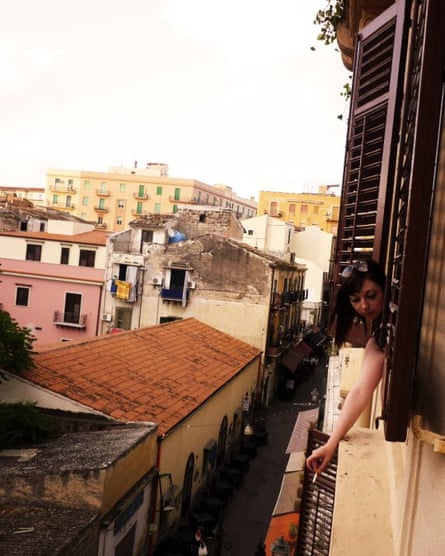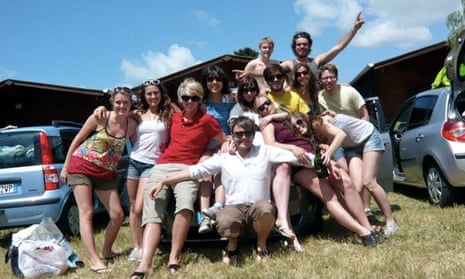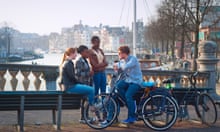The end of the decade prompted, for me, a brief reactivation of Facebook in order to remind myself what I’d been up to 10 years ago. Getting drunk with a load of Europeans, it turned out. The pictures show us on a succession of sweaty nights out, grinning after too many Long Island iced teas (chosen because you got the maximum bang for your buck), our sense of affectionate comradeship clear from the arms we have thrown around one another, our faces smushed together. I had been studying in Italy, living in a hall of residence with a mix of Italians and foreign exchange students, as part of the Erasmus programme – an EU student foreign exchange scheme founded in 1987, now known as Erasmus+.
On Wednesday night, as part of Brexit legislation, MPs voted down an amendment that would have required the government to negotiate continued membership of Erasmus+. A Department for Education spokesman later said: “The government is committed to continuing … the next Erasmus+ programme,” but added the ominous caveat, “if it is in our interests to do so.” But its lack of real interest in this important scheme makes me truly sad. Contrary to the story told by the photographs, Erasmus meant so much more to me than a year of partying. It opened the world to me.
I’d travelled very little and, having spent the bulk of my childhood in a Welsh village, had not met many people from other countries. As soon as I turned 18 I moved to Paris: a gap year that sounds posher than it was (I was a waitress and a nanny). It taught me the value of living abroad and a new language. Studying modern languages was an obvious next step, and with that came Erasmus.
It’s hard to express all that this programme gave me, without becoming emotional. I didn’t have the kind of resources that made travel an option. I could never have afforded to move to Italy without the grant the EU gave me. I would never have learned Italian, a language I love, or discovered the same passion I have for the country’s literature, cinema and art. I would never have developed the confidence you gain from having to navigate the complex bureaucracy of another country, or from being cross-examined in front of a packed lecture theatre in a foreign language about the paintings of Leonardo da Vinci. I would not have seen Sicily, or Venice, or Sardinia in the company of so many new friends.

I met people from all over the world. Our extended friendship group encompassed the UK, Italy, France, Greece, the Netherlands, Denmark, Sweden, Finland and Germany. Years later, a gratifying number came to my wedding, despite having scattered on an international scale in the time since. There were four of us Welshies; one now lives in Berlin, another in Copenhagen. I have friends in Athens and Stockholm, Australia, the United States and, of course, Italy, a country with which I fell passionately in love, though at times – as when I was catcalled by two men driving a hearse (they shouted “che figa”, loose translation: “what a hot pussy”) – that love was not returned in quite the fashion I expected.
Such moments of transnational discovery were often hilarious, as you’d expect with so many cultures rubbing up against one another, often literally. I’ll never forget one friend announcing that he had spent the weekend with his genitals when he meant to say parents, nor the time I asked for pineapple on my pizza in order to troll my date, and the chef shouted from the back that he thought he had a can somewhere, but I’d have to add it myself as he couldn’t bring himself to do it. There were weird incidents, too: paying protection money to park the car; getting lost in Venice for so long that the sun began to rise; a €500 wheel of parmesan handed over as compensation for a place wrecked after a party, pretending our dads were in Depeche Mode while hitchhiking because we thought it would prevent us being kidnapped. One classmate moved into a crumbling old mansion with a record producer in the cellar, an old man in the west wing, several sex workers and an entire room full of fur coats. Another found herself waitressing at an orgy.
I suppose it all sounds a bit debauched, and probably not what the Erasmus press office might have in mind (nor, I imagine, was the classic film L’Auberge Espagnole, though a better tribute to Erasmus cannot be found), but when you’re living abroad and young you tend to end up in situations that you couldn’t have predicted, not to mention relationships.
I treasure all of it and will carry it with me for the rest of my days. It’s all part of the life experience of living in another country, and that is a gift. No doubt some Brexiters will frame Erasmus as a cushy holiday for a privileged few: let them. Those of us who took part know the doors that it opened, and will mourn for the future generations who’ll be missing out if this does turn out to be the end of the programme.
My world was small and it grew big, thanks to my experiences in Europe. On 31 January, I’ll think first of all the people I had the pleasure of meeting, and maybe look again at a few of those cheesy photographs, our idiotic, naive, hopeful faces. It’s a beautiful thing to mix with other cultures, especially when you’re young. It didn’t have to end here.











